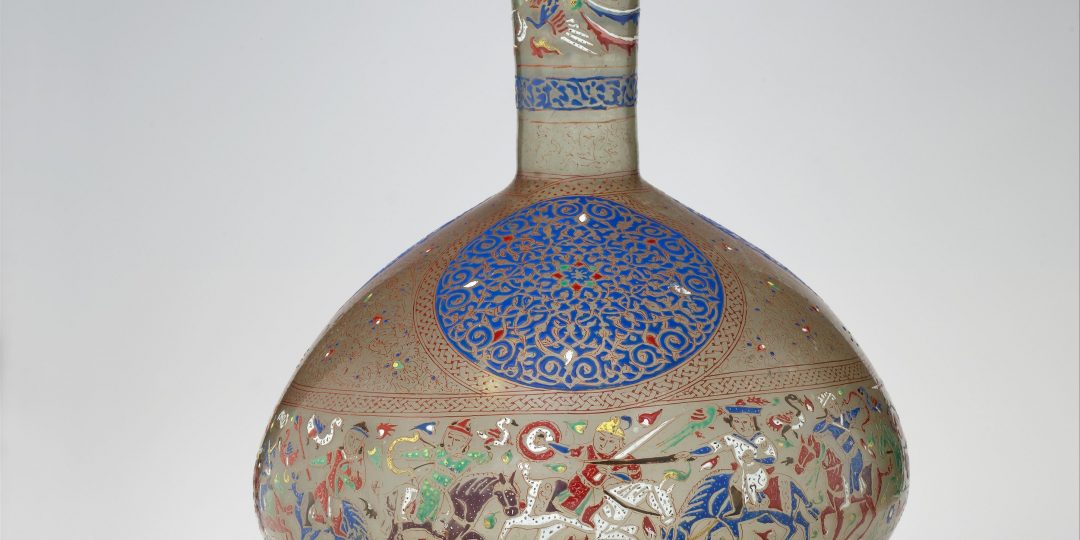
HIAA Biennial Symposium
Looking Widely, Looking Closely
The Metropolitan Museum of Art
New York
10.18-10.18.12
10.18.12
18:00-18:45
Keynote
Wives, Concubines, Daughters and Mothers: The Multiple Paths to Female Patronage of Visual Arts
Priscilla Soucek
John L. Loeb Professor in the History of Art, Institute of Fine Arts, New York University
19:00-21:00
Welcome reception, Institute for the Study of the Ancient World, New York University
10.19.12
10:00-11:00
Panel
PANEL 1: Formation and Transformation in Umayyad Art
Finbarr Barry Flood
Chair
Nadia Ali
The South Arabian Component of Umayyad Royal Iconography
Donald Whitcomb
Khirbet al-Mafjar or Qasr Hisham? Changing Perceptions of a Palestinian Monument
Theodore van Loan
Umar's Bargain: Skirting Litholatry at the Dome of the Rock
11:00-12:00
Panel
PANEL 2: Form and Meaning in Arabic, Persian and Indian Manuscripts
Massumeh Farhad
Chair
Jaclynne J. Kerner
Art and Artifice in the Illustrated Herbal of al-Ghafiqi
Eloise Brac de la Perriere
A Set of Unexplored Manuscripts: Bihari Writing Qur'ans in Sultanate India
Ayse Pinar Gokpinar
The Concept of Time and Space: Understanding Temporality in the Representations of the Topkapi Persian Falnama
13:00-14:00
Panel
PANEL 3: On Paper, Poetry, and Painting
Eleanor Sims
Chair
Jake Benson
Naqsh Bar Ab: Safavid Marbled Papers of the Late 16th to Early 17th century
Fateme Montazeri
Sermon in the Mosque or Socio-Religious Critique?: Analysis of a Safavid Illustration of a Hafez Poem
Emily Neumeier
An Anatolian Mont Sainte-Victoire: Approaching Modern Turkish Painting
15:00-16:00
Panel
PANEL 4: Medieval Identities and Beyond
Eva R. Hoffman
Chair
Amanda Luyster and Mika Natif
Kalila Two Ways: East and West
Robert Ousterhout and D. Fairchild Ruggles
Islamic Monuments and National Patrimony in Modern Spain
18:00-20:00
Reception at the Institute of Fine Arts, New York University
10.20.12
10:00-11:00
Panel
PANEL 5: From Mosques to Mosaic and Mirrors: Islamic Architecture and its Decoration
Sheila Blair
Chair
Ruba Kana’an
The Friday Mosque Revisited: the Meaning, Function, and Evolution of an Architectural Paradigm
Chanchal Dadlani
Orthodoxy and Aesthetics in Mughal Architecture: The Moti Masjid of ‘Alamgir I’
Sophia Shafi
Every Torn Piece of My Heart Becomes a Green Meadow: The History and Religious Function of ‘Aineh-Kari’ in Persianate Architecture
Carol Bier
Overlapping Decagons on the Iranian Plateau: History of Architecture and the History of Mathematics
11:00-12:00
Panel
PANEL 6: Relocating History: Interventions of Islamic Architecture and Decoration in England, Greece and Cairo
Nebahat Avcioglu
Chair
Melanie Gibson
Colouring the Surface: A Taste for Tiles in English Domestic Architecture, 1850-1920
George Manginis
Iznik in Athens: Ottoman-Style Tile Revetments on Inter-War Public Buildings in Greece
Anna McSweeney
The Afterlife of the Alhambra
13:00-14:00
Panel
PANEL 7: Reconstructing Meaning Through Historiography and Museology
Navina Haidar
Chair
Mercedes Volait
Monument or Ornament? Early French Architectural Histories of Islamic Buildings in Egypt
Alyson Wharton
The Paradigm of a Favoured Community and Armenians in the History of Islamic Architecture
Keelan Overton
Patterns of Revivalism: The Safavid/Pahlavi Case Study through a Pan-Islamic Lens
Mirjam Shatanawi
Indonesian Islamic Art: The Historiography of a Neglected Heritage
14:00-15:00
Panel
PANEL 8: Objectifying the Islamic Object: From Ottoman Silk Flags to Twelfth-century Minbars to a Thirteenth-century Brass Tray with Processional Figures
Linda Komaroff
Chair
Bernard O’Kane
A Tale of Two Minbars: Woodwork in Egypt and Syria on the Eve of the Ayyubids
Hana Taragan
Figures in Procession: Thoughts on a Tray Stand from Doha, Qatar
Barbara Karl
Ottoman Silk Flags as Objects of Propaganda in the Conflict Between Habsburgs and Ottomans during the 17th and early 18th centuries
Registration
Registration is closed. This event has already taken place.
